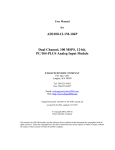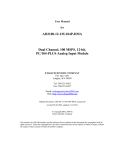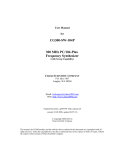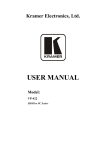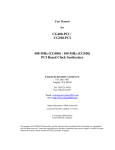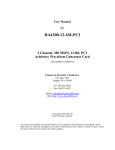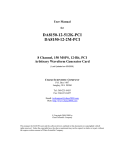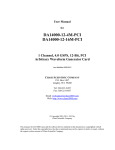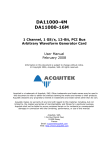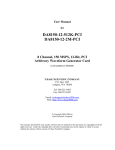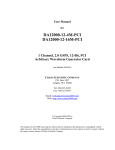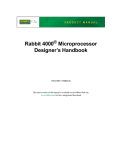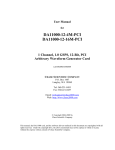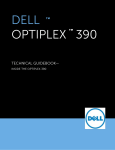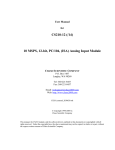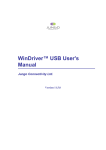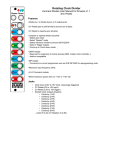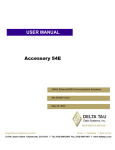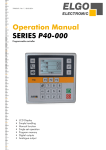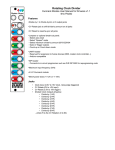Download User`s Manual V1 - Chase Scientific Company
Transcript
User Manual for AD2100-12-1M-104P-DMA (PreTrigger Capable Version) Dual Channel, 100 MSPS, 12-bit, PC/104-PLUS Analog Input Module CHASE SCIENTIFIC COMPANY P.O. Box 1487 Langley, WA 98260 Tel: 360-221-8455 Fax: 360-221-8457 Email: [email protected] Web: http://www.chase2000.com Original Document: AD2100-12-1M-104P-DMA_PreTrig_manual.odt (created 05-06-2004, updated 11/6/2011) Copyright 2004 - 2010 by Chase Scientific Company This manual, the AD2100 module, and the software drivers outlined in this document are copyrighted with all rights reserved. Under the copyright laws, the above mentioned may not be copied, in whole or in part, without the express written consent of Chase Scientific Company. AD2100 User Manual 100 MSPS, PC/104+ ANALOG INPUT MODULE TABLE OF CONTENTS 1 GENERAL INFORMATION...........................................................................................................................4 1.1 INTRODUCTION..................................................................................................................................................4 1.2 REFERENCES....................................................................................................................................................4 1.3 DELIVERABLES.................................................................................................................................................4 1.3.1 Software................................................................................................................................................4 1.3.2 Hardware..............................................................................................................................................4 1.3.3 Checklist................................................................................................................................................5 1.4 PRODUCT SPECIFICATION....................................................................................................................................5 1.5 TECHNICAL SUPPORT / SOFTWARE UPDATES.........................................................................................................6 1.6 WARRANTY.....................................................................................................................................................6 2 HARDWARE DESCRIPTION........................................................................................................................7 2.1 INTRODUCTION..................................................................................................................................................7 2.2 BLOCK DIAGRAM..............................................................................................................................................7 2.3 BOARD DRAWING.............................................................................................................................................8 2.4 BOARD I/O.....................................................................................................................................................9 2.4.1 Header Pinouts and Pin Descriptions..................................................................................................9 2.5 HARDWARE REGISTER DEFINITIONS...................................................................................................................10 2.6 ANALOG INPUT RANGES AND RESOLUTION.........................................................................................................10 3 THEORY OF OPERATION..........................................................................................................................11 3.1 INTRODUCTION................................................................................................................................................11 3.2 ACQUIRING ANALOG INPUT DATA.....................................................................................................................11 4SOFTWARE DRIVERS..................................................................................................................................11 4.1 INTRODUCTION................................................................................................................................................11 4.2 DRIVER INSTALLATION.....................................................................................................................................11 4.2.1 Windows 2000/XP...............................................................................................................................11 4.2.2 Linux Installation (Kernels 2.0x, 2.2x, 2.4x).......................................................................................12 4.2.3Windows 98/ME/NT4...........................................................................................................................13 4.3 FUNCTION CALLS............................................................................................................................................13 4.3.1 Function Declarations in C................................................................................................................13 4.3.2 Function Call Descriptions / Usage...................................................................................................14 4.3.2.1 ad2100_CountCards()..................................................................................................................................14 4.3.2.2 ad2100_Open()............................................................................................................................................15 4.3.2.3 da2100_Close()............................................................................................................................................15 4.3.2.4 ad2100_Reset()............................................................................................................................................16 4.3.2.5 ad2100_SetClockRate()...............................................................................................................................16 4.3.2.6 ad2100_SetSegment_Size().........................................................................................................................17 4.3.2.7 ad2100_SetNumSegments().........................................................................................................................17 4.3.2.8 ad2100_SetTrigPol()...................................................................................................................................17 4.3.2.9 ad2100_SoftTrig().......................................................................................................................................18 4.3.2.10 ad2100_Digitize()......................................................................................................................................18 4.3.2.11 ad2100_Digitize_Done()...........................................................................................................................19 4.3.2.12 ad2100_TransferData()..............................................................................................................................19 4.4PROGRAMMING EXAMPLES................................................................................................................................20 4.4.1 Windows/Linux Example Using Generic C/C++................................................................................20 5MISCELLANEOUS.........................................................................................................................................21 5.1CALIBRATION..................................................................................................................................................21 5.2MAINTENANCE................................................................................................................................................21 © Chase Scientific Company [email protected] 2 AD2100 User Manual 100 MSPS, PC/104+ ANALOG INPUT MODULE ILLUSTRATIONS / TABLES FIGURE 1 – BLOCK DIAGRAM......................................................................................................................8 FIGURE 2 – BOARD LAYOUT.........................................................................................................................9 FIGURE 3 - 4-PIN DIGITAL I/O CONNECTOR..........................................................................................10 © Chase Scientific Company [email protected] 3 AD2100 User Manual 1 100 MSPS, PC/104+ ANALOG INPUT MODULE GENERAL INFORMATION 1.1 Introduction The AD2100-12-1M-104P-DMA is a PC/104-Plus analog I/O module which features two (2) 12-bit, high speed singled-ended (50 ohms) synchronous input channels, each capable of capturing data at 100 MSPS with a minimum bandwidth of 50 MHz. The AD2100 module operates over industrial temperature range standard (40°C to 85°C). Analog inputs, trigger input, and clock inputs are available on SMA connectors. It also has on-board clocks as well. Each high speed channel has 1Meg memory per channel of software selectable onboard memory using programmable segment sizes. Each segment is independently triggered and packed into memory. Trigger source can be either an external TTL trigger or on-board software trigger. Timing is controlled by an onboard clock circuit referenced to a 100 MHz crystal oscillator and can be programmed for 100MHz, 50MHz, ..., 12.5MHz. The user can also use an external clock. Once A/D conversions are completed, data can be transferred from the module to main memory using DMA transfers at up to 110MBytes/sec using simple function calls. 1.2 References PC/104-Plus Specification, Version 2.0, November 2003 by PC/104 Embedded Consortium. “P996.1 Standard for Compact Embedded-PC Modules”; PC/104 Specification, Version 2.3, June 1996 by PC/104 Consortium. “IEEE P996 draft standard”, 1987 by IEEE Standards Committee. This bus standard was the basis for the first PC/104 standard released in 1992. 1.3 1.3.1 Deliverables Software The AD2100 comes with one set of drivers for Windows 98/NT/2000/XP, and a separate set for WinVista/7. Software comes on a single Mini-CD. Call Chase Scientific for the latest information on drivers for other operating system platforms or check the web site for the latest updates. Software drivers are provided as a Dynamic Link Library (*.DLL) which is compatible with most 32-bit windows based development software including Microsoft C++ and Borland C++. This DLL uses the “cdecl” calling convention which is default capatible with the compilers above. See "readme.txt." files in the appropriate directories for installion instructions. 1.3.2 Hardware The AD2100 hardware consists of a single PC/104-Plus compliant module. The module is shipped with a manual with complete hardware and software descriptions. The ISA bus connector (PC/104 only portion) is © Chase Scientific Company [email protected] 4 AD2100 User Manual 100 MSPS, PC/104+ ANALOG INPUT MODULE configured as a passthrough mode but does not directly connect to any circuitry on the card. This card can only be accessed as a PCI device according to PC/104-Plus specification. 1.3.3 Checklist Item # Qty Part Number 1 1 AD2100-12-1M-104P-DMA Dual 100 MSPS, 12-bit, A/D PC/104-Plus Module 2 1 AD2100-Drivers Mini-CD with Dynamic Link Libraries for Windows 98/NT/2000/XP. Includes "example_snippet.txt". 3 1 AD2100-Manual User manual for AD2100 board and software drivers. 1.4 Description Product Specification (all specifications are at 25C unless otherwise specified) HIGH SPEED ANALOG INPUTS (CH1-2) (2) Synchronous, Single Ended into 50 ohms Number of inputs A/D Resolution 12-bit (1 part in 4096) Input Bandwidth 50 MHz minimum @ 2V pk to pk (Av=1) Input Range The A/D count of 0 equals -1.0V min. A count of 4095 equals +1.0V min. (order option 3 for user specified FIXED gain) Acquisition Time to Full-Scale Step 16 ns typical to 0.01% (1/2 LSB) Input Coupling 50 ohms load to ground/shield Overvoltage Protection +/- 5V Maximum Nonlinearity +/- 2 LSB typical Conversion Rate / channel 100 MHz maximum, Programmable down to 12.5MHz (mod 2), + EXT. CLK down to 1 MHz. Lower is possible with A/D degradation. Memory Size 1048576 samples maximum (optional 2097152) Segment Sizes Software selectable segment sizes from 1 to 2097152 with Number of Segments from 1 to 2097152 as long as it fits into memory. Pre-Trigger Size Range 0 to 2097149 Acquisition Mode Single-shot initiated by software, external or internal triggering (see trigger sources) Timebase 100 MHz, 50 MHz, 25 MHz, 12.5 MHz (Software Selectable), + EXT CLK Trigger Location Fixed trigger position at beginning of each segment Sources external TTL signal (3.3V TTL), internal software trigger Slope Positive, Negative Coupling DC External Clock Input Frequenc Range 1 MHz through 100 MHz Amplitude Range 0dBm - 6dBm (square/sine wave) Coupling AC GENERAL Power Supply (Vcc) Operating Temperature Operating Humidity Size Data Bus © Chase Scientific Company +5V @ 860mA (12.5 MSPS) +5V @ 1240mA (100 MSPS) 0 to 70 degrees C standard -40 to +85 degrees C extended 5 to 95% non-condensing PC/104-Plus: 3.55" x 3.775" 32-bits PCI [email protected] 5 AD2100 User Manual 1.5 100 MSPS, PC/104+ ANALOG INPUT MODULE Technical Support / Software Updates For technical support: Phone Fax Email Mail (360) 221-8455 (360) 221-8457 [email protected] Chase Scientific Company P.O. Box 1487 Langley, WA 98260 For software updates: Email Web 1.6 [email protected] http://www.chase2000.com Warranty Chase Scientific Company (hereafter called Chase Scientific) warrants to the original purchaser that its AD2100-12-1M-104P, and the component parts thereof, will be free from defects in workmanship and materials for a period of ONE YEAR from the data of purchase. Chase Scientific will, without charge, repair or replace at its option, defective or component parts upon delivery to Chase Scientific’s service department within the warranty period accompanied by proof of purchase date in the form of a sales receipt. EXCLUSIONS: This warranty does not apply in the event of misuse or abuse of the product or as a result of unauthorized alterations or repairs. It is void if the serial number is altered, defaced or removed. Chase Scientific shall not be liable for any consequential damages, including without limitation damages resulting from loss of use. Some states do not allow limitation or incidental or consequential damages, so the above limitation or exclusion may not apply to you. This warranty gives you specific rights. You may also have other rights that vary from state to state. Chase Scientific warrants products sold only in the USA and Canada. In countries other than the USA, each distributor warrants the Chase Scientific products that it sells. NOTICE: Chase Scientific reserves the right to make changes and/or improvements in the product(s) described in this manual at any time without notice. © Chase Scientific Company [email protected] 6 AD2100 User Manual 2 100 MSPS, PC/104+ ANALOG INPUT MODULE HARDWARE DESCRIPTION 2.1 Introduction The AD2100 hardware consists of the following major functions: • (2) 12-bit, 100 MSPS synchronous, single-ended, bipolar A/D Inputs (DC coupled) • (1) TTL Trigger Input • (1) TTL, ECL, Sinewave Clock Input (AC coupled) 2.2 Block Diagram Figure 1 – Block Diagram © Chase Scientific Company [email protected] 7 AD2100 User Manual 2.3 100 MSPS, PC/104+ ANALOG INPUT MODULE Board Drawing Figure 2 – Board Layout © Chase Scientific Company [email protected] 8 AD2100 User Manual 2.4 100 MSPS, PC/104+ ANALOG INPUT MODULE Board I/O 2.4.1 Header Pinouts and Pin Descriptions JP4 2 4 6 8 1 3 5 7 [Short only 1 set:] 1,2 => ID_SEL3 3,4 => ID_SEL2 5,6 => ID_SEL1 7,8 => ID_SEL0 JP5 [MUX SELECT OF GNT/REQ/INT] 1 2 MUX_SEL_0 3 4 MUX_SEL_1 5 6 INT1# 7 8 INTA# 1= OPEN, 0=SHORT (SEL_1, SEL_0) GNT/REQ 0, 0 0 0, 1 1 1, 0 2 1, 1 n/a INT* INTA# INTB# INTC# INTD# JP3 2 4 6 8 1 3 5 7 [Short only 1 set:] 1,2 => CLK3 3,4 => CLK2 5,6 => CLK1 7,8 => CLK0 (default) (default) (default) * => Valid for INT1# shorted, INTA# open. If INT1# open and INTA# shorted, then INTA# always selected regardless of SEL_1/0. IDSEL and BUS CLOCK SELECT Headers ==> © Chase Scientific Company [email protected] 9 AD2100 User Manual 2.5 100 MSPS, PC/104+ ANALOG INPUT MODULE Hardware Register Definitions Due to hardware protocol complexity, the details on how to use these ports are beyond the scope of this manual. The software drivers should provide an effortless integration path for the user. However, if the need arises that is beyond what the software drivers can provide, please call the factory for technical support. 2.6 Analog Input Ranges and Resolution Analog input range is by default +/- 0.528V. Consult factory for user gain setting options. The resolution is 12 bits. © Chase Scientific Company [email protected] 10 AD2100 User Manual 3 100 MSPS, PC/104+ ANALOG INPUT MODULE THEORY OF OPERATION 3.1 Introduction Because the PC/104-Plus bus is slower than the digitizing rate of the AD2100, the data must first be digitized and stored on the AD2100 and then transferred to system memory at the slower bus speed. 3.2 Acquiring Analog Input Data Before capturing data, the user must first setup the correct digitizing rate, trigger input mode, trigger polarity, number of segments, segment size, and pretrigger value (if applicable). After proper setup is performed, you’re ready to digitize. When the digitize function is called, the A/D converter is activated and begins storing data into buffer RAM. If multiple segmented memory is used where triggered blocks of memory is packed together until some set memory limit is met, then the USER must set up the segment size and number of segments to be digitized. If post/pre-triggering is enabled, then the trigger detect circuit will initially be suppressed until the user programmed pretrigger time has elapsed. Then, after the pretrigger timer has completed and the trigger event has occurred, the A/D data will continue to be stored into the onboard buffer RAM until the postrigger timer has run out. 4 SOFTWARE DRIVERS 4.1 Introduction The primary objective in designing software drivers is to get the user up and running as quickly as possible. The details on installing software drivers are listed in 4.2.xx. While the listing of function calls and their parameter definitions are listed in section 4.3.xx, the programming examples in section 4.4.x will show you how to include them into your programs. The drivers are designed to work under Windows 98/ME/NT4/2000/XP. 4.2 4.2.1 Driver Installation Windows 2000/XP 1) Do not install AD2100 card at this time. 2) UnZip all files into directory "C:\temp\AD2100\" (create directories if needed) You can move and/or copy the files later to a directory of your choice. 3) Run Register_AD2100_Win2000_XP.bat. This will copy the Kernel driver windrvr6.sys to "c:\<windir>\system32\drivers\" directory and will register the Kernel driver in the Windows Registry so © Chase Scientific Company [email protected] 11 AD2100 User Manual 100 MSPS, PC/104+ ANALOG INPUT MODULE that it starts up each time the computer is rebooted. 4) Power off computer. Insert AD2100 card. Power up computer. 5) When OS asks for Driver File point to "AD2100_P9054.inf". If OS does not ask for file, then check hardware configuration and update if not listed properly under "Jungo" in Device Manager (see below). To check to see which driver is installed, do the following: => Control Panel => System => Hardware => Device Manager => Jungo AD2100_P9054 WinDriver If you see another driver in place of "AD2100_P9054", then right click the first device under Jungo and click properties. Update the driver by pointing to "AD2100_P9054.inf". You may have to go through a series of menus. 4.2.2 Linux Installation (Kernels 2.0x, 2.2x, 2.4x) Example Linux Installation on RH9.0 (version 2.4.20-8) ----------------------------------------------------- 02/04/2005 1. Before you start Install Red Hat Linux 9.0 (Kernel 2.4.20-8). Make sure the GNU C++ compiler, tools, and libraries are installed. This requires using the custom install mode or simply installing all packages. 2. Install the Kernel Driver Make sure you log on as administrator (root level). Copy the archive file "ad2100.tgz" from the CD (or download) to the directory "/root/ad2100" (for example). Open the ad2100.tgz by using the archive manager "File Roller" or use "tar xvzf ad2100.tgz". This will create two folders, "WinDriver" and "ad2100_src" in this directory. Copy the "WinDriver" folder to the directory "/usr/local". This will create the directory "/usr/local/WinDriver" with all the support files needed to recompile the WinDriver Kernel. Type the following commands in a terminal windows while in directory "/usr/local/WinDriver/redist": A) # ./configure NOTE: The configure script creates a makefile based on your specific running kernel. B) # make © Chase Scientific Company [email protected] 12 AD2100 User Manual 100 MSPS, PC/104+ ANALOG INPUT MODULE C) # make install 3. Install the ad2100 Interface Driver with Sample (user) Test Program. To compile sample test program change to directory "/root/ad2100/ad2100_src". Then type "make all". This will compile, link, and create the interface library ad2100_o.o as well as the test application, ad2100_test. Just use the test application as a skeleton for your own interface/application program. 4.2.3 Windows 98/ME/NT4 1) Do not install AD2100 card at this time. 2) UnZip all files into directory "C:\temp\AD2100\" (create directories if needed) You can move and/or copy the files later to a directory of your choice. 3) Run "Register_AD2100_Win98_ME_NT4.bat". This will copy the Kernel driver windrvr6.sys to "c:\<windir>\VMM32\" directory and will register the Kernel driver in the Windows Registry so that it starts up each time the computer is rebooted. 4) Power off computer. Insert AD2100 card. Power up computer. 5) When OS asks for Driver File point to "AD2100_P9054.inf". If OS does not ask for file, then check hardware configuration and update if not listed properly under "Jungo" in Device Manager (see below). To check to see which driver is installed, do the following: => Control Panel => System => Hardware => Device Manager => Jungo AD2100_P9054 WinDriver If you see another driver in place of "AD2100_P9054", then right click the first device under Jungo and click properties. Update the driver by pointing to "AD2100_P9054.inf". You may have to go through a series of menus. 4.3 4.3.1 Function Calls Function Declarations in C Header File for C Function Calls => //--------------------------------------------------------------------------#ifndef ad2100_dllH © Chase Scientific Company [email protected] 13 AD2100 User Manual 100 MSPS, PC/104+ ANALOG INPUT MODULE #define ad2100_dllH //--------------------------------------------------------------------------#define IMPORT extern "C" __declspec(dllimport) DWORD TempArray[2097152]; #include <iostream.h> #include <stdio.h> #include <stdlib.h> #include <fcntl.h> #include <sys\stat.h> #include <io.h> #include <string.h> // User Function calls IMPORT DWORD ad2100_CountCards(void); IMPORT DWORD ad2100_Open(DWORD CardNum); IMPORT DWORD ad2100_Close(DWORD CardNum); IMPORT void ad2100_Reset(DWORD BrdNum); IMPORT void ad2100_SetClockRate(DWORD BrdNum, DWORD DivideBy); // SegSize: 2 to 2097151; PreTrig: 0 to 2097149 IMPORT void ad2100_SetSegment_Size( DWORD BrdNum, DWORD SegSize, DWORD PreTrig);IMPORT void ad2100_SetNumSegments(DWORD BrdNum, DWORD NumSeg); // 1 - 1048575 IMPORT void ad2100_SetTrigPol(DWORD BrdNum, DWORD TrigPol); // 0=Pos Edge, 1=Neg Edge IMPORT void ad2100_SoftTrig(DWORD BrdNum); IMPORT void ad2100_Digitize(DWORD BrdNum); IMPORT DWORD ad2100_Digitize_Done(DWORD BrdNum); IMPORT void ad2100_TransferData(DWORD BrdNum, DWORD SEG_SIZE, DWORD NUM_SEGS, PVOID UserArrayPtr); #endif 4.3.2 Function Call Descriptions / Usage 4.3.2.1 ad2100_CountCards() Description Returns number of AD2100 cards present on computer. Declaration DWORD ad2100_CountCards(void); Parameters none Return Value Returns with an encoded value which represents the number of AD2100. Return Values: © Chase Scientific Company [email protected] 14 AD2100 User Manual 0: 1-4: 13: 100 MSPS, PC/104+ ANALOG INPUT MODULE Kernel Driver ok, but no card found Normal range of possible number of cards detected Kernel Driver not working Example DWORD Num_ad2100_Boards = ad2100_CountCards(); 4.3.2.2 ad2100_Open() Description Loads the AD2100 software drivers and sets the AD2100 board to its default state. Declaration DWORD ad2100_Open(DWORD CardNum); Parameters CardNum: 1 <= CardNum <= 4 Return Value Returns with error code. A "0" means everything is fine. See below for details for other values. Return Values: 0: Opened Windriver Successfully and AD2100 Card Found Successfully 1: Opened Windriver Successfully, but NO AD2100 CARDS FOUND 2: Opened Windriver Successfully, AD2100 card found, but Cannot Open Driver to other Board Functions. 3: Opened Windriver Successfully, Board already open. 6: Card number exceeds number of cards. 13: FAILED TO OPEN Windriver Kernel Driver Example DWORD OpenErrorCode = ad2100_Open(1); // Opens Board Number 1 and stores value. 4.3.2.3 da2100_Close() Description Closes AD2100 drivers. Should be called after finishing using the driver. However, if no other software uses the “windrv.xxx” (usual situation), then there is no need to close it until user is ready to completely exit from using their main software program. Declaration DWORD ad2100_Close(DWORD CardNum); Parameters CardNum: 1 <= CardNum <= 4 Return Value Returns with error code. A "0" means everything is fine. See below for details for other values. Return Values: 0: Closed Windriver Successfully for AD2100 card requested. 5: AD2100 Card Already Closed for card requested. 13: FAILED TO ACCESS Windriver Kernel Driver © Chase Scientific Company [email protected] 15 AD2100 User Manual 100 MSPS, PC/104+ ANALOG INPUT MODULE Example DWORD CloseErrorCode = ad2100_Close(1); 4.3.2.4 ad2100_Reset() Description Resets memory counters and triggering functions (re-arms). This should be called immediately after opening card for the first time and every time before "ad2100_Digitize" is called . Declaration void ad2100_Reset(DWORD BrdNum); Parameters CardNum: 1 <= CardNum <= 4 Return Value None. Example ad2100_Reset1); 4.3.2.5 ad2100_SetClockRate() Description Sets internal clock rate based on on-board clock or external clock. Declaration void ad2100_SetClockRate(DWORD BrdNum, DWORD DivideBy); Parameters CardNum: 1 <= CardNum <= 4 DivideBy: 0: 100 MegaSamples/second 1: 50 MegaSamples/second 2: 25 MegaSamples/second 3: 12.5 MegaSamples/second 4: External Clock 5: Ext. Clock / 2 6: Ext. Clock / 4 7: Ext. Clock / 8 Recommend External Clock Range ==> Frequency Range: 1MHz - 100 MHz Amplitude: 0dBm - 6dBm Return Value None. Example ad2100_SetClockRate(1,0); // Set board # 1 to 100 MegaSamples © Chase Scientific Company [email protected] 16 AD2100 User Manual 100 MSPS, PC/104+ ANALOG INPUT MODULE 4.3.2.6 ad2100_SetSegment_Size() Description Sets the segment size and Pre-Trigger size. Do not exceed the maximum memory size => (Segment Size)*(Number of Segments) = 1048576 or 2097151 depending on model number. Declaration void ad2100_SetSegment_Size(DWORD BrdNum, DWORD SegSize, DWORD PreTrig); Parameters BrdNum: SegSize: PreTrig: 1 <= CardNum <= 4 2 <= SegSize <= 2097151 0 <= PreTrig <= 2097149 Return Value None. Example ad2100_SetSegment_Size(1,1024,100); // Sets board #1 for Segment Size = 1024 Samples and PreTrigger of 100 Samples. 4.3.2.7 ad2100_SetNumSegments() Description Sets number of segments before digitize is complete. User can also call reset at any time to start over if number of triggers is not sufficient to finish the digitize process. Do not exceed the maximum memory size => (Segmend Size)*(Number of Segments) = 1048576 or 2097151 depending on model number. Declaration void ad2100_SetNumSegments(DWORD BrdNum, DWORD NumSeg); Parameters BrdNum: NumSeg: 1 <= CardNum <= 4 1 <= NumSeg <= 1048575 Return Value None. Example ad2100_SetNumSegments(1,3); // Set board #1 for 3 Segments 4.3.2.8 ad2100_SetTrigPol() Description Sets which edge will cause a trigger to occur. Declaration void ad2100_SetTrigPol(DWORD BrdNum, DWORD TrigPol); © Chase Scientific Company [email protected] 17 AD2100 User Manual 100 MSPS, PC/104+ ANALOG INPUT MODULE Parameters BrdNum: 1 <= CardNum <= 4 TrigPol: 0: Positive Edge Triggered 1: Negative Edge Triggered Return Value None. Example ad2100_SetTrigPol(1,0); // Set board #1 for Positive Edge Trigger 4.3.2.9 ad2100_SoftTrig() Description Creates a trigger as if an external hardware trigger action occurred. Declaration void ad2100_SoftTrig(DWORD BrdNum); Parameters BrdNum: 1 <= CardNum <= 4 Return Value None. Example ad2100_SoftTrig(1); // Creates trigger under software control for Brd #1 4.3.2.10 ad2100_Digitize() Description Must always call "ad2100_Reset()" first to reset memory controller. Board must be open, of course (see ad2100_Open). All other functions such as SetClockRate, SetSegmentSize, SetNumSegments, SetTrigPol do not have to be called again unless changes are made. Reset is the only function that is required to called each time before a new digitize. Declaration void ad2100_Digitize(DWORD BrdNum); Parameters BrdNum: 1 <= CardNum <= 4 Return Value None. Example ad2100_Digitize(1); // Starts to digitize on board #1 © Chase Scientific Company [email protected] 18 AD2100 User Manual 100 MSPS, PC/104+ ANALOG INPUT MODULE 4.3.2.11 ad2100_Digitize_Done() Description This function is used to check to see if "ad2100_Digitize()" had comleted. This call can be put into a multiplexed timing loop (or thread) to avoid tying up the microprocessor. When this function comes back "1", then the user can transfer the data safely. Declaration DWORD ad2100_Digitize_Done(DWORD BrdNum); Parameters BrdNum: 1 <= CardNum <= 4. Return Value 0: 1: False True Example DWORD BoardDone = ad2100_Digitize_Done(1); // Check to see if Board #1 has completed the digitize process. 4.3.2.12 ad2100_TransferData() Description Transfers the stored digitized data located on the PC/104 module to the System memory location pointed to by "UserArrayPtr". "ad2100_Digitize_Done" much be True before calling this function. Declaration void ad2100_TransferData(DWORD BrdNum, DWORD SEG_SIZE, DWORD NUM_SEGS, PVOID UserArrayPtr); Parameters BrdNum: SEG_SIZE: NUM_SEGS: UserArrayPtr: 1 <= CardNum <= 4 1 <= SEG_SIZE <= 2097151 (NUM_SEGS*SEG_SIZE) <= 2MEG Pointer to User's Array. Return Value None. Example ad2100_TransferData(1,128,1,UserArrayPtr); // Transfers 1 segment worth of 128 samples data from board #1 to users array pointed to by UserArrayPtr. © Chase Scientific Company [email protected] 19 AD2100 User Manual 4.4 100 MSPS, PC/104+ ANALOG INPUT MODULE Programming Examples 4.4.1 Windows/Linux Example Using Generic C/C++ //////////////////////////////////////////////////////////////// // File - ad2100_test.c // // Example code for accessing the AD2100 PC/104+ module. // //////////////////////////////////////////////////////////////// #include #include #include #include <stdio.h> <stdlib.h> <string.h> <math.h> #include "a2100_dll_import.h " int main(int argc, char *argv[]) { //-------------------------------------------------------------------// 1) INITIALIZE VARIABLES //-------------------------------------------------------------------DWORD TempArray[8192]; DWORD NumCards; DWORD ad2100_error_code; printf("\n"); for (DWORD x=0; x<8192; x++) TempArray[x] = 0; //-------------------------------------------------------------------// 2) CHECK FOR NUMBER OF AD2100 CARDS, OPEN DRIVERS, REPORT ANY ERRORS //-------------------------------------------------------------------NumCards = ad2100_CountCards(); printf("AD2100_Test NumCards Opened = %d\n",NumCards); if (NumCards > 0) ad2100_error_code = ad2100_Open (1); printf("AD2100_Test ad2100_error_code = %d\n",ad2100_error_code); if (ad2100_error_code > 3) return(0); // ad2100_error_code: 0 // 3 // 6 // 13 = = = = ok, ok, card already open Number of cards exceeded Kernel Driver not working //-------------------------------------------------------------------// 3) SETUP CARD //-------------------------------------------------------------------ad2100_Reset(1); // Resets card's registers, Re-Arms Trigger // ==> Must always call before ad2100_Digitize(1) ad2100_SetClockRate(1,1); ad2100_SetSegment_Size(1,128); © Chase Scientific Company // Set clock to 50MHz // Set segment size to 128 [email protected] 20 AD2100 User Manual 100 MSPS, PC/104+ ANALOG INPUT MODULE ad2100_SetNumSegments(1,1); ad2100_SetTrigPol(1,0); triggered // Set number of concatenated segments to 1 // Set trigger input to positive edge //-------------------------------------------------------------------// 4) DIGITIZE / WAIT FOR DONE / TRANSFER DATA TO "TempArray" //-------------------------------------------------------------------ad2100_Digitize(1); use "ad2100_SoftTrig()") ad2100_SoftTrig(1); // Digitizes when TTL trigger is present (or for (DWORD x=0; x < 4000; x++) { if (ad2100_Digitize_Done(1) == 1) { ad2100_TransferData(1,128,1,TempArray); Array printf("TRANSFER DATA COMPLETE \n"); break; } } // Poll until Digitize = 1 // Transfer data to User for (DWORD x=0; x < 40; x++) printf("CHAN_1[%2d] = %5d CHAN_2[%2d] = %5d\n",x,(TempArray[x] & 0x0000FFF),x,((TempArray[x] >> 12) & 0x0000FFF) ); //-------------------------------------------------------------------// 5) CLOSE DRIVER IF EXITING FROM MAIN PROGRAM //-------------------------------------------------------------------ad2100_Close(1); } 5 // Run this before quitting/shutting down master program, // otherwise you can leave card open. return (0); MISCELLANEOUS 5.1 Calibration The AD2100 has no user feature to calibrate for input and output gain accuracy or offsets. The gains and offsets are calibrated at the factory to be within 3% at 25ºC and nominal voltages with inputs terminated by 50 ohms source. 5.2 Maintenance No maintenance is required. However, a yearly calibration is recommended if the user desires to maintain the AD2100 modules’ specified accuracy. Call factory for maintenance and/or extended warranty information. © Chase Scientific Company [email protected] 21 AD2100 User Manual 100 MSPS, PC/104+ ANALOG INPUT MODULE Trademarks: MS-DOS, Windows 3.1, Windows 95, Windows NT, Windows 2000, and Windows XP are registered trademarks of Microsoft Corporation. © Chase Scientific Company [email protected] 22






















